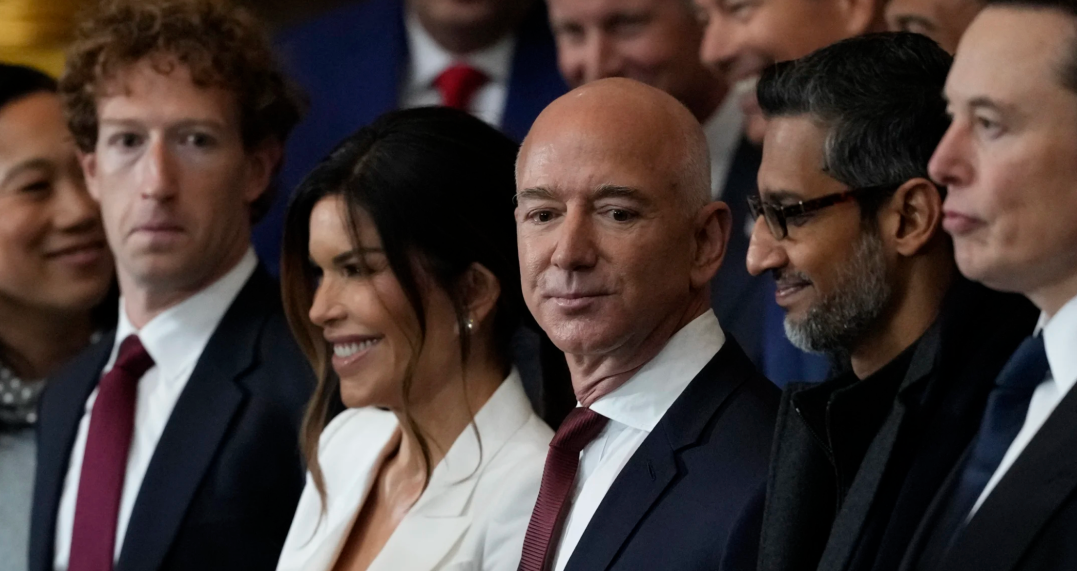Several major tech moguls were given priority seats at President Trump’s second inauguration on Monday, including X owner Elon Musk, Meta’s Mark Zuckerberg, Amazon founder Jeff Bezos and TikTok CEO Shou Zi Chew.
These high-profile executives made the cut for the limited seating inside the Capitol Rotunda, which has a capacity of roughly 600, while several of Trump’s Cabinet appointees and other prominent politicians, including Florida Gov. Ron DeSantis, were relegated to watch the ceremony from an overflow room.
The image of these tech CEOs seated behind Trump at his inauguration seemed to illustrate a notable shift that has been taking shape in the relationship between the president and Silicon Valley.
Here’s what to know about them.
Elon Musk, CEO of Tesla and SpaceX, executive at X
Elon Musk at the 60th presidential inauguration in the rotunda of the U.S. Capitol. (Kevin Lamarque/AP)
Musk, the CEO of Tesla and SpaceX, purchased Twitter, now X, one of the biggest social media platforms in the U.S., in 2022.
The relationship between Trump and Musk has changed significantly over the last few years. In 2016, Musk described Trump to CNBC as “not the right guy” to be president. But he donated more than $200 million to pro-Trump super PACs throughout the 2024 election and even interviewed Trump on X.
Musk was at Mar-a-Lago with Trump on election night and was later announced to join Vivek Ramaswamy to lead the newly created Department of Government Efficiency, or DOGE. Since then, several outlets, including the New York Times, have reported that Musk has joined “almost every meeting and many meals” Trump has had since becoming elected — even including the Trump family’s Thanksgiving dinner.
Meta CEO Mark Zuckerberg at the 60th presidential Inauguration. (Chip Somodevilla/AP)
Zuckerberg has made headlines for the last few weeks for several major decisions he’s made for Meta, the company he founded in 2004. First, he announced Meta would be ending its partnerships with independent fact-checkers because he claimed the groups were too politically biased. Then, he revealed a plan to kill the company’s diversity initiatives, in line with Trump’s plans to sign an order ending diversity, equity and inclusion programs. And he assembled a new leadership team with advisers like Joel Kaplan, who has ties to the Republican Party.
Zuckerberg’s recent actions seem to mark a significant shift in Meta’s relationship with Trump. After the Capitol attack on Jan. 6, 2021, Meta suspended all of Trump’s accounts on its platforms. But following the assassination attempt against Trump in July 2024, Zuckerberg seemed to try to reset the public perception of their relationship by calling Trump a “badass.” Although Zuckerberg did not publicly endorse Trump at the time, Meta donated $1 million to his inaugural fund.
Zuckerberg will be co-hosting a black-tie reception tonight, alongside Houston Rockets owner Tilman Fertitta, former Republican National Committee finance chair Todd Ricketts and Republican mega-donor Miriam Adelson.
Jeff Bezos, CEO of Amazon and owner of the Washington Post
Jeff Bezos at the 60th presidential inauguration. (Julia Demaree Nikhinson/AP)
Bezos, who has owned the Washington Post since 2013, made headlines during the 2024 election when he announced that the Post would not endorse any presidential candidate for the first time in 36 years. Like Meta, Amazon contributed $1 million to Trump’s inaugural fund and also announced that it would play live footage of the inauguration ceremony on Amazon Prime Video.
Bezos and Trump had a contentious relationship during his first term in the White House. Trump slammed the Post’s headlines and repeatedly criticized Amazon, accusing the company of not paying taxes properly.
Bezos seemed to change his perception of Trump in late 2024, telling the New York Times’ DealBook Summit on Dec. 4 that he was “actually very optimistic” about Trump’s second presidential term.
Shou Zi Chew, CEO of TikTok
TikTok CEO Shou Zi Chew at the 60th presidential inauguration. (Kevin Lamarque/AP)
TikTok has dominated headlines recently, after a law, passed by Congress and signed by now-former President Biden in April 2024, required the popular app to be sold by its Chinese parent company or be banned in the U.S.
Trump initially proposed banning TikTok back in 2020 if it wasn’t sold to an American company. However, while running for reelection in 2024, he launched his own TikTok account and told followers that he would “SAVE TIK TOK IN AMERICA” if he won the election. Trump appears to have intervened to stop the ban, which was supposed to take effect on Jan. 19, one day before his inauguration.
Read more from Yahoo News: TikTok was officially banned Sunday morning, but did Trump save it? Here’s where things stand.
Sundar Pichai, CEO of Google
Google CEO Sundar Pichai speaks with Elon Musk at the 60th presidential inauguration. (Ricky Carioti/AP)
Pichai was seated with Musk, Zuckerberg and Bezos on the inaugural platform during the ceremony.
In 2018, under questioning by Congress, Pichai insisted that the fact that Trump’s photo was a top result when Google users searched the word “idiot” was not a result of intentional bias. But Trump accused the search engine of intentionally “rigging” search results against him, a complaint he has continued to make as recently as October 2024.
Tim Cook, CEO of Apple
Apple CEO Tim Cook at the 60th presidential inauguration. (Kevin Lamarque/AP)
While Apple has not made any donations to Trump, Cook personally donated $1 million to Trump’s inaugural committee.
Cook was one of the first CEOs who publicly congratulated Trump after he won the election and visited Trump at Mar-a-Lago in December.



